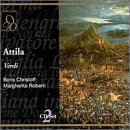| All Artists: Giuseppe Verdi, Boris Christoff, Gastone Limarilli, Giangiacomo Guelfi, Margherita Roberti, Mario Frosini Title: Verdi: Attila Members Wishing: 0 Total Copies: 0 Label: Opera D'oro Original Release Date: 1/1/1962 Re-Release Date: 11/28/2000 Genre: Classical Style: Opera & Classical Vocal Number of Discs: 2 SwapaCD Credits: 2 UPC: 723723939029 |
Search - Giuseppe Verdi, Boris Christoff, Gastone Limarilli :: Verdi: Attila
 | Giuseppe Verdi, Boris Christoff, Gastone Limarilli Verdi: Attila Genre: Classical
|
Larger Image |
CD Details |
CD ReviewsTwo fine, dark voices in a good live performance L. E. Cantrell | Vancouver, British Columbia Canada | 09/30/2005 (5 out of 5 stars) "Source: Live performance at Teatro Comunale, Florence; December 1, 1962.
Sound: Fairly good mono, somewhat better than usual for a live performance of its date. Cast: Attila - Boris Christoff; Ezio - Giangiacomo Guelfi; Odabella - Margherita Roberti; Foresto - Gastone Limarilli; Uldino - Franco Franchi; Leone - Mario Frosini. Orchestra e Coro di Teatro Comunale conducted by Bruno Bartoletti. Documentation: No libretto. Short summary of the plot. The track list does not indicate who is singing or show timings. This is a basically sound performance of a better than average early Verdi opera. As is usual with operas of the Nineteenth Century, "Attila" has a certain lofty indifference to tiresome historic fact. On the other hand, its straight-forward plot is not so deliriously free-form as that of Verdi's "Giovanna d'Arco." The music is full of the muscularity which so distinguishes Verdi from his great predecessors, Rossini, Bellini and Donizetti, but lacks the precise character delineation that marks Verdi's middle period. In short, lots of bouncy oom-pah-pah but not yet a Rigoletto, Violetta or Azucena. The main strength of this performance lies in the confrontation between two fine exemplars of their respective national singing styles. Boris Christoff offers an Attila who is all hard, dark-edged Slavic bass. He is met by the smoother, rounder, Italianate bass-baritone of Giangiacomo Guelfi. Since both men had enormous voices, it must have been quite a night at the Teatro Comunale. The rest of the cast is competent, although the tenor, Limarilli, would have seemed a little underpowered even without the thunderings of Christoff and Guelfi. This is an enjoyable performance of a good early Verdi opera with two very impressive singers--five stars. A NOTE FOR THE HISTORICALLY CURIOUS: The most famous line in this opera is uttered by Ezio (Aetius in the history books) in which he says approximately, "Take the rest of the world but leave Italy to me." From the very first performance of the opera this drew cheers from patriotic Italians smarting under the domination of Austrian occupiers at a time when German speakers were already coming to be thought of as "Huns." The line is actually rather unfair to Aetius, since it has him trying to cut a deal for his own personal benefit. In fact, Aetius, who with Visigothic allies had already defeated Attila once at the Battle of Chalons, was probably the only admirable Roman of his generation, a character failing that inevitably led to his murder by the unusually pusillanimous Emperor Valentinian III. In the opera, Attila (whose name means "Little Father") meets his death at the hand of Odabella, a Roman woman whom he is preparing to marry. In history, even as Attila was threatening to sack Rome, he was looking forward to a marriage offered by Valentinian's sister, Honoria. (Not an unprecedented thing. Honoria's mother, Gallia Placida, had been part of the spoils when the Visigoths captured Rome in 410. She had later married the Visigoth king, apparently quite willingly. As his widow, she had made it all the way back to Rome to become the de facto Empress of the Western Empire.) Here is how Edward Gibbon tells the tale: "Before the king of the Huns evacuated Italy, he threatened to return more dreadful, and more implacable, if his bride, the princess Honoria, were not delivered to his ambassadors within the term stipulated by the treaty. Yet, in the mean while, Attila relieved his tender anxiety by adding a beautiful maid, whose name was Ildico, to the list of his innumerable wives. Their marriage was celebrated with barbaric pomp and festivity, at his wooden palace beyond the Danube; and the monarch, oppressed with wine and sleep, retired at a late hour from the banquet to the nuptial bed. His attendants continued to respect his pleasures or his repose the greater part of the ensuing day, till the unusual silence alarmed their fears and suspicions; and, after attempting to awaken Attila by loud and repeated cries, they at length broke into the royal apartment. They found the trembling bride sitting by the bedside, hiding her face with her veil, and lamenting her own danger, as well as the death of the king, who had expired during the night. An artery had suddenly burst. . . . His body was solemnly exposed in the midst of the plain under a silken pavilion and the chosen squadrons of the Huns, wheeling round in measured evolutions, chanted a funeral song to the memory of a hero, glorious in his life, invincible in his death, the father of his people, the scourge of his enemies, and the terror of the world." A FURTHER NOTE FOR WAGNERITES: German tribes, largely Ostrogoths, made up at least half of Attila's army. Germanic poets were impressed by the end of the great Hun king as much as the Latin historians paraphrased by Gibbon. They also remembered pretty, frightened Ildico, whom they called Kriemhild. They thought she was a princess of the Burgundians, that one of her two brothers was Gunther, the Burgund king, and the other was Hagen, who not long before had murdered her first husband, Siegfried." |

 Track Listings (11) - Disc #1
Track Listings (11) - Disc #1